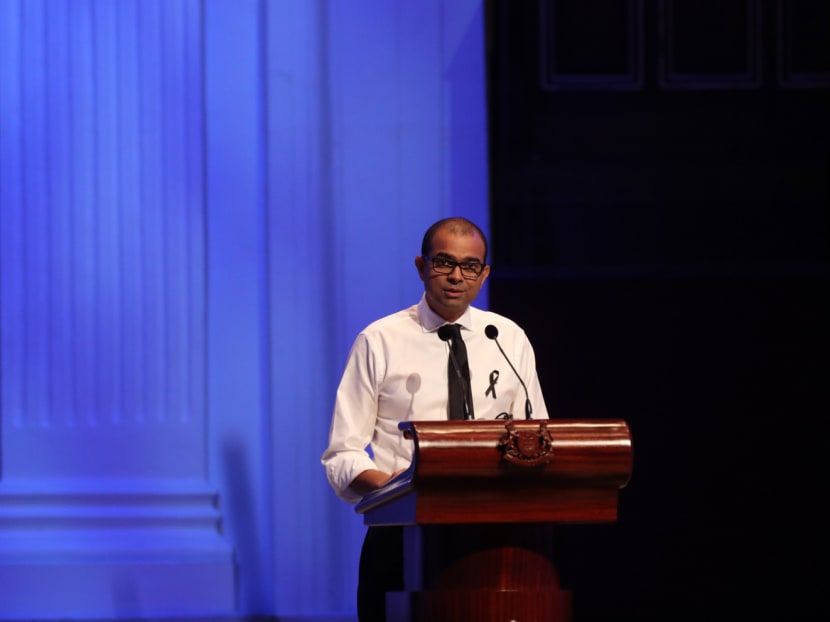Othman Wok, colleagues ‘helped build shared space in Singapore’
SINGAPORE — The idea of shared sacrifice as a way to develop the common space, and a forward-looking attitude that keeps seeking to make tomorrow better, are among the legacies left behind by Mr Othman Wok and his generation of leaders, said Minister of State Janil Puthucheary yesterday.

Minister of State Janil Puthucheary speaking at the late Othman Wok’s memorial service at Victoria Concert Hall on Wednesday (April 19). Photo: MCI
SINGAPORE — The idea of shared sacrifice as a way to develop the common space, and a forward-looking attitude that keeps seeking to make tomorrow better, are among the legacies left behind by Mr Othman Wok and his generation of leaders, said Minister of State Janil Puthucheary yesterday.
Speaking at the late former minister’s memorial service at Victoria Concert Hall yesterday, Dr Puthucheary hailed Mr Othman’s efforts in championing multiracialism and his approach to “building a shared space built on compromise and sacrifice”.
Instead of taking the path of least resistance, where the dominant majority’s interests took precedence over everything else, or following a path of idealism and symbolism and “pretending that race was not an important factor”, he lauded Mr Othman and other pioneer leaders for choosing the untried and difficult route that was “unlike anything that had been attempted before in history”.
“(In establishing a shared space), it was not one where each tribe, group or community was encouraged to fight for their position ... (or) set up as an adversarial relationship where community leaders were encouraged to think in terms of winners and losers ... (The pioneers) recognised that a shared approach to sacrifice would in the end benefit all,” said the Minister of State (Education, and Communications and Information).
Hence, all communities had to give up something for the greater good — be it language, religious practice, dress codes or social customs. “We developed a consciousness that in matters of racial harmony, giving was better than taking, sacrifice and compromise were better than winning,” he added.
Dr Puthucheary noted that the pioneer leaders planted the seed in Singapore where “we do not have to accept the world as it is”, and this was even more remarkable considering the turbulent times that they were living in then.
Mr Othman and his colleagues lived in a world where there were wars and conflicts, and ideologies such as communism, capitalism and imperialism were reaching Singapore’s shores. It was also a period when there were limited jobs and education, and expectations of loyalty arose simply “because of the colour of your skin or the religion” of one’s family, or ancestry.
Yet Mr Othman had both a “discontent with the state of things around him” and “a willingness to do something about it”.
“In this environment, it was remarkable for a handful of people to believe that their ideas and ideals could heal and shape an entire country. To look at all this around you and believe that you can do something about it. This takes confidence and courage,” Dr Puthucheary said.
“It is a courage not just in your own self-confidence or own abilities, but a faith and trust in your comrades ... It is an extra step of courage (to have faith in) someone who looks or sounds different from you, that they stand by you as you stand by them and share the same ideals,” he added.






